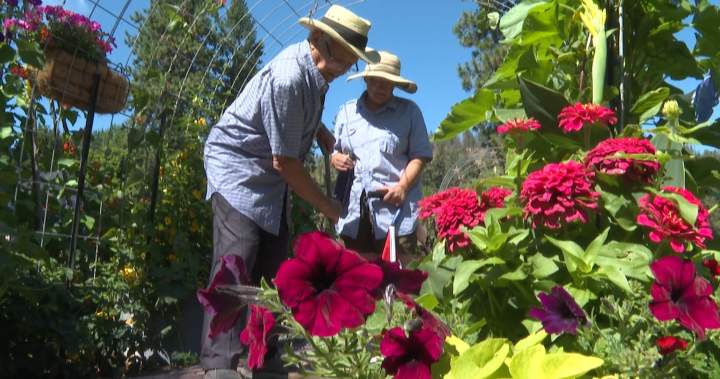The late September sun filters through yellowing aspen leaves as John Wallace carefully sorts purple carrots freshly pulled from the soil. At 77, his skilled hands have a slight tremor, but they still remember the rhythms of farm work that occupied his earlier years.
“This takes me right back to my grandfather’s farm in the Kootenays,” he tells me, his face brightening beneath the brim of a well-worn cap. “I haven’t touched dirt like this in thirty years, not since my wife and I sold our place.”
Wallace is among the twelve participants gathered today at Wander Farm, British Columbia’s first dedicated dementia care farm, nestled in the rolling hills of the Okanagan Valley. The 6-acre property represents a growing movement integrating therapeutic care with agricultural activities for people living with dementia and Alzheimer’s disease.
Farm founder Marina Kowalchuk, a registered nurse who specialized in dementia care for over two decades, watches as participants harvest, sort, and prepare vegetables for the local food bank. “We’re not just providing activities,” she explains. “We’re creating meaningful work that connects people to their past skills and gives them purpose. Many of our participants grew up on farms or had gardens. This environment triggers positive memories in ways a clinical setting simply cannot.”
Research increasingly supports what Kowalchuk has observed firsthand. A 2021 study published in the Canadian Journal of Aging found that nature-based interventions significantly reduced agitation and improved mood in dementia patients. Another study from the University of British Columbia showed that regular engagement with soil and plants increased cognitive function scores by 12% over six months compared to traditional indoor therapies.
The concept of “care farming” originated in the Netherlands in the 1990s, where farms opened their gates to provide therapeutic environments for various vulnerable populations. Today, the Netherlands has over 1,400 care farms, while the practice has spread throughout Europe, Australia, and parts of the United States. Canada, however, has been slower to adopt the model.
“When I first proposed this, funders and healthcare administrators weren’t sure what to make of it,” Kowalchuk recalls. “They understood day programs in clinical settings, but the idea of putting people with cognitive impairments on a working farm raised safety concerns.”
Those concerns proved unfounded. Three years into operation, Wander Farm has maintained an impeccable safety record while demonstrating measurable benefits for participants—and their families.
Arlene Chow, whose mother attends twice weekly, credits the farm with dramatically improving her mother’s quality of life. “Mom was becoming withdrawn at home and in her traditional day program. Here, she’s engaged. She comes home tired in a good way, talking about the chickens and what she planted. It gives her—and me—something positive to focus on besides the disease.”
The farm operates year-round, adapting activities to the seasons. Spring brings planting and preparation, summer focuses on growth and maintenance, fall centers on harvest, and winter shifts to indoor activities like preparing preserves, crafting with dried flowers, and caring for the farm’s animals.
“We find ways to engage everyone regardless of ability level,” says Melissa Truong, an occupational therapist who helps design the farm’s programming. “Someone might not remember how to follow complex instructions, but their body remembers how to dig or water plants. We meet people where they are.”
The economic model is innovative as well. Participants pay a daily fee comparable to traditional day programs, but the farm supplements this income by selling a portion of its produce at local farmers’ markets and to restaurants interested in supporting the social enterprise. The farm also partners with the Interior Health Authority, which refers patients and provides partial subsidies.
Health economist Dr. Robert Chen from Simon Fraser University has been studying the financial implications of care farms. “When we factor in reduced medication use, fewer hospital visits for secondary issues like falls or depression, and delayed entry into residential care, the care farm model shows promising cost-effectiveness compared to traditional approaches,” he explains.
The potential broader impact hasn’t gone unnoticed by provincial policymakers. With British Columbia’s senior population projected to increase by 63% by 2041, according to Statistics Canada, innovative dementia care solutions are increasingly urgent. The Alzheimer Society of B.C. estimates that over 70,000 people in the province currently live with dementia—a number expected to double within two decades.
Last spring, the B.C. Ministry of Health announced a $3.5 million grant program to develop more nature-based dementia care initiatives, citing Wander Farm as a successful proof of concept. Two additional care farms are now in development in the Fraser Valley and on Vancouver Island.
Back among the garden beds, John Wallace has moved on to harvesting tomatoes, working alongside Gurdeep Kaur, a 68-year-old participant whose family operated orchards in the region for generations before selling to corporate interests.
“I tell my children, when I’m here, I’m not a patient. I’m a farmer again,” Kaur says, carefully placing tomatoes in her basket. “The disease takes away so much. But here, I give something back. I grow food that helps others.”
As the afternoon progresses, I notice subtle but meaningful dynamics among participants. People who struggle with verbal communication find connection through shared tasks. A woman who rarely speaks in other settings hums contentedly while feeding chickens. A former accountant who now has difficulty with basic arithmetic confidently demonstrates to others how to test soil moisture with his fingertips.
“Dementia often strips away people’s social roles and sense of competence,” Kowalchuk observes. “Here, everyone contributes according to their abilities, and everyone belongs.”
As Canada’s population ages and dementia rates climb, initiatives like Wander Farm challenge conventional approaches to care by reconnecting people with nature, purpose, and community. The simple act of growing food becomes a powerful therapeutic tool—one that honors the whole person beyond their diagnosis.
“We’re not curing dementia,” Kowalchuk acknowledges as we watch participants board their transportation home, tired but visibly satisfied. “But we’re showing that life with dementia can still include joy, purpose, and dignity. Sometimes the most innovative care approaches aren’t about new technologies or medications—they’re about returning to what fundamentally makes us human: connection to land, meaningful work, and being valued as part of a community.”






